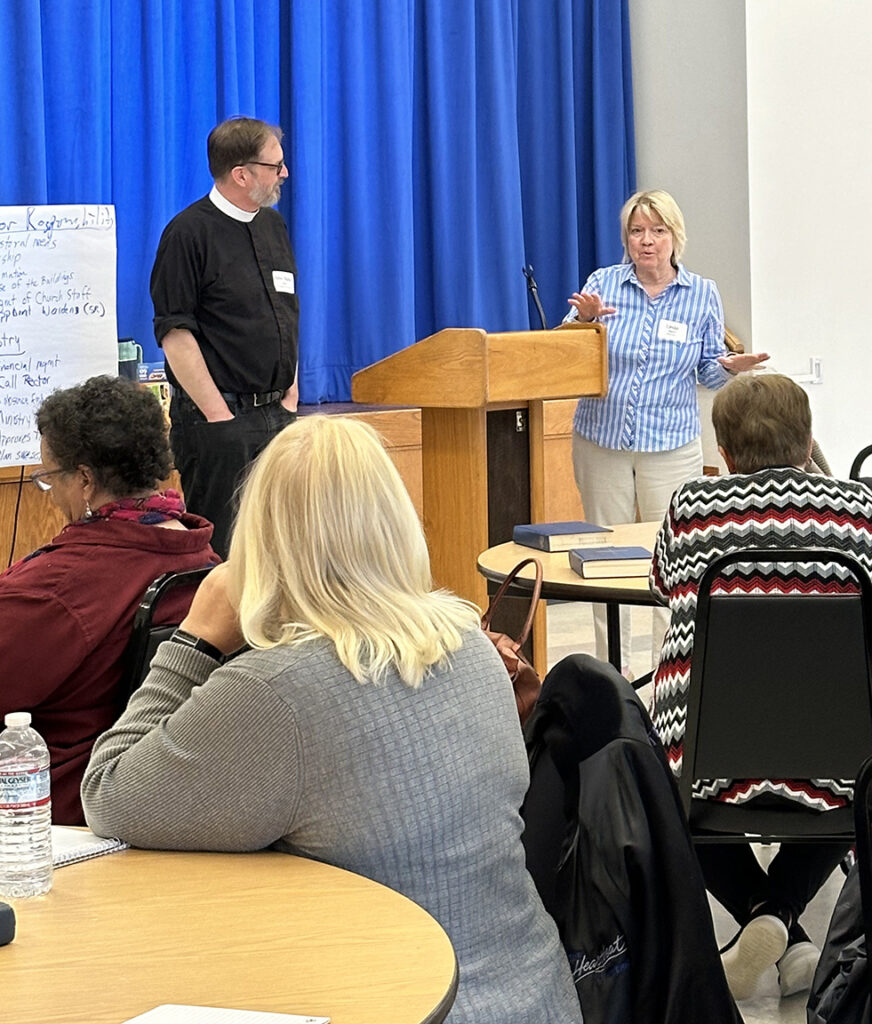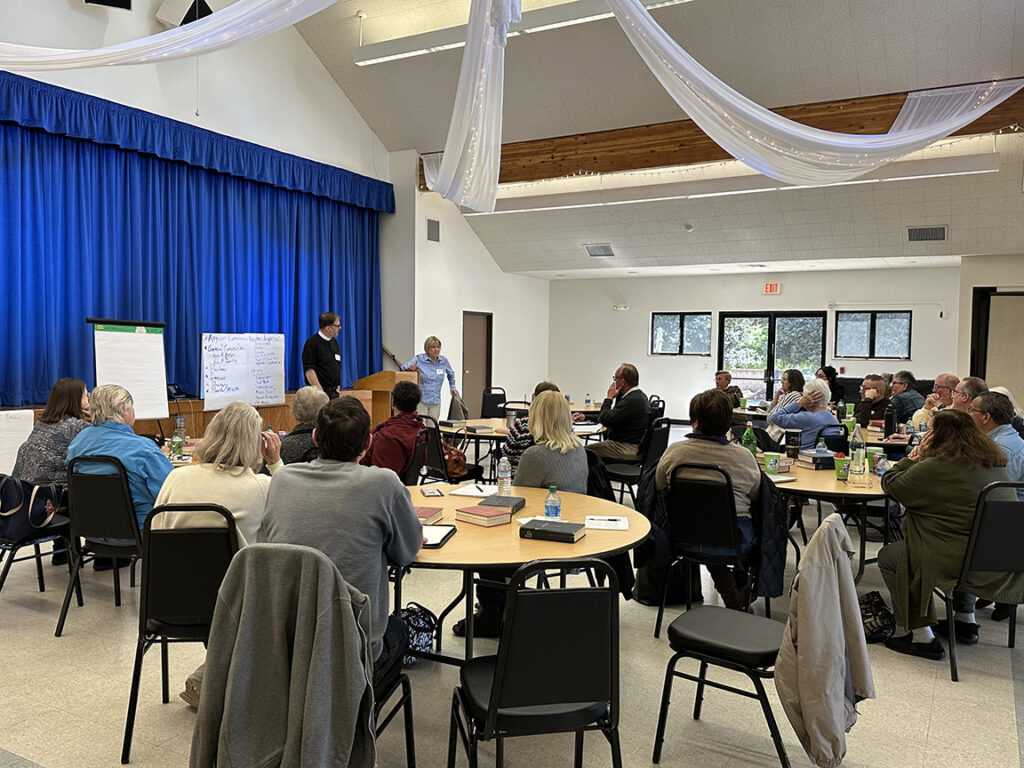
Nate Rugh, rector of St. Augustine’s Church, Santa Monica, and Linda Allport, dean of Bloy House, teach a class on Episcopal Identity for members of Deanery 6 congregations. Photo: Sandra Martinez
[The Episcopal News] When visitors become members at St. Paul’s Church in Pomona, “it totally renews my faith,” says Sandra Martinez Moore. “I believe it is a sign God sends us that we are doing what we’re supposed to be doing, what God is calling us to do and that we’re trying the best we can with what we have.”
Moore and ten other members of the Inland Empire congregation are participants in a Bloy House-Deanery 6 pilot program to empower lay leadership in churches that are without regular, full-time clergy – a challenge affecting an estimated 40 congregations throughout the diocese.
Or, as Moore, who works full time as a licensed vocational nurse, says, “We are stepping up to maintain the church and its worship every Sunday.”
In addition to work and family responsibilities and attending classes regularly, she creates the congregation’s Sunday worship booklet, serves on vestry, altar guild, and as a chaplain, and leads noon prayer for a weekly Spanish-language ministry. She heads the church’s chapter of the Order of the Daughters of the King and, along with two other chaplains, will soon begin leading morning prayer and healing services every third Sunday. She is also a Bloy House board member.
The church has managed to get by with supply clergy but “the opportunity Bloy House is giving us is huge,” she told The Episcopal News. “It empowers. It makes my heart happy, and a lot of people should take advantage of these classes.
“I have learned so much,” added Martinez Moore, who also participates in Instituto de Liderazgo, the diocesan Spanish-language lay leadership training program.
“St. Paul’s is a wonderful worshipping community that people within that community are determined to continue,” despite a lack of clergy presence, said Linda Allport, dean of Bloy House, the Episcopal Theological School at Los Angeles. “They are very vibrant in terms of what we’d all like to see in a church.”
‘Episcopal boot camp’ and a new understanding
The Deanery 6 pilot program began April 6 with about 35 attendees at a one-day, in-person “boot camp”-style Episcopal identity workshop, because “understanding the history, polity, theology and worship of The Episcopal Church is foundational,” Allport said.
And the better informed the laity, the stronger the church. “Students discover why they love The Episcopal Church as much as they do and how to explain it to friends,” she said. “It’s kind of a confirmation class but much more; why do I love it and why do I want to be a lay minister in this church?”

The Bloy House-led class on Episcopal Identity was held on April 6.
The Very Rev. Keith Yamamoto, rector of St. Mark’s Church, Upland, and dean of Deanery 6, said the program “equips lay people for their baptismal ministry at a time there is a great need for lay leadership, when we do not have as many full-time clergy.” At least three congregations in the deanery – Christ Church, Ontario; St. John’s, La Verne; and St. Paul’s – are without full-time clergy. But even in congregations with full-time clergy, “the program is a good thing, because it equips people for ministry,” Yamamoto said. “Laity are entering into leadership roles. I’m appreciative of diocesan efforts to help congregations in this way. It will open new avenues of collaboration.”
In addition to Episcopal identity, coursework includes introduction to the Bible, pastoral care, beginning preaching, worship leadership and governance. And, as with all Episcopal church offerings, antiracism is a requirement, Allport said.
The program is designed to confer three licenses – lay preacher, lay worship leader, and lay pastoral leader – “because we thought those licenses would have the most impact on congregations.”
The experience is cost-effective; enrollment in all six classes totals about $125. Classes are free to pilot program attendees, underwritten by a $100,000 Trinity Church Wall Street grant this year, she said.
Classes will end June 1 when Bishop Diocesan John Harvey Taylor will officiate at a celebration and award of licenses, Allport said.
“It’s an ambitious program and compressed schedule but when it’s all done in two months, you’re going to come out on the other side with all kinds of tools and skills, with training to do the things you want to do for your church,” she said.
Clergy mentorship is vital to the program, Allport added. “We’re not having the number of hours you’d have in a homiletics class. We’re not turning out seminary preachers, but rather people who want to expand their skills in this way and have done the work.”
Bishop Taylor enthusiastically supports the Bloy House initiative.
“Congregations struggling to be able to provide a priest for Holy Eucharist every Sunday still have a gospel-deep commitment to remaining in their churches and neighborhoods, glorifying God and caring for God’s people,” he said. “This cohort of well-trained and educated ministers will come alongside lay leaders and available clergy to make sure the prayers are said and the gospel is preached and taught each week. It’s not a permanent solution. It’s what the Holy Spirit is doing right now as, through our ongoing discernment, we learn more about the work of the church in these times. I’m deeply grateful to Bloy House for rallying to make it all possible.”
Taylor stressed that when lay ministers are leading worship or serving in other leadership roles, according to the canons of the church they won’t be in charge of congregations. In situations without a priest in charge, the vestry and wardens of a parish compose the ecclesiastical authority. In the case of missions, it’s the wardens and bishop’s committee, on behalf of the bishop. (See related article by Bishop Taylor here.)
Lay and clergy ministers: not ‘fixers,’ but ‘guiders to God in Christ’
Most classes team-taught by clergy and laity. An April 11 online pastoral care class was led by the Rev. Brian Tucker, assisting priest at Prince of Peace Church in Woodland Hills, and by Sharon Crandall, director of Prism Restorative Justice Ministry. In that session, students learned “we’re not fixers,” said Tucker. “We are guiders to the ultimate fixer, who is God in Christ.”
“Pastoral care is the Christian practice of promoting the flourishing of persons and their communities,” Tucker said. “Pastoral care therefore tends to the spiritual, physical, and emotional needs of people, so they might build healthy relationships with God, themselves and others.”
Crandall told students that lay ministry “is the heart of the church. I just try to keep showing up and following my heart, but it’s not easy.” She shared the importance of discovering a pastoral identity, “understanding what it is that draws you into this work, and owning that identity with dependable authority – very much like our own Episcopal identity that many of us learned about last weekend” in a previous class.
Pastoral identity is rooted in Scripture, prayer, worship, and faith, “and it’ll always be about love and it will never fail you even when it feels like failure.”
The licensing program offers a workaround for dedicated laity who may not be interested in pursuing ordination.
For example, Mark Milliron, 69, a physician’s assistant who serves weekly as a lay leader at St. Alban’s Church in Yucaipa, enrolled in 2023 when Bloy House classes were first offered throughout the diocese. They changed his life, he said.
“It is really important that the laity have a sense of serving together with the priesthood, that … we all work for the Gospel, maybe in different ways, but this is the future of the church; some marriage of more visible lay and ordained ministry.”
He aims to combine his two loves, church and medicine, by hosting a May health fair in Yucaipa, and by opening a clinic one day a week to care for the health needs of unhoused and other members of the local community.
“It’s a first foray into saying, ‘we’re here and we’d like you to know we care about you,’” he told The News. “It’s something I felt led by the Spirit to do. I’ve quit my full-time practice. I’m working one day a week so I can eat, and the other days, I help out at St. Alban’s and enjoy being part of the community.”
Catherine Gero, a parishioner at St. Stephen’s Church in Santa Clarita, says the classes have excited her and offered the opportunity to explore, not only a sense of call to the diaconate, but also have “deepened my desire to understand what God is calling me to do, to be. I will better serve my parish with all that I have learned, whatever path God leads me.”
And when Alan Herendich isn’t driving a school bus to and from Apple Valley and Hesperia for the Big Bear district, he’s at St. Richard’s Church, Sky Forest, where he adjusts the sound system, is the bass section for the choir, “presses the buttons on the control” to play pre-recorded hymns, makes repairs as sexton, and leads morning prayer when the priest can’t make it.
The Bloy House classes have been invaluable, he says, as he anticipates possible clergy shortages. “I took the classes so I could be a worship leader,” said Herendich, who is also a lay deputy to the 81st General Convention June 23 – 28 in Louisville, Kentucky.
“I am used to doing everything within the church and I can see that there are fewer people. As long as I can, I want to be a part of it and to look for solutions of where we go from here and how we deal with things.”
More about lay ministry training opportunities at Bloy House is available on its website. A related article about transitions and new leadership at Bloy House is here.)
